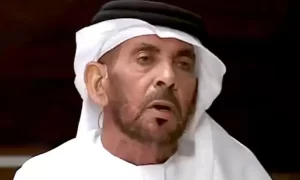A Personal Revelation at a Literary Festival
A well-known Emirati cultural heritage researcher, Saeed Musabah Al Ketbi, has made a revelation that has taken Gulf social media by storm. Speaking at the annual literary festival in Sharjah, Al Ketbi shared details of his personal life that immediately caught public attention.
He disclosed that he has been married four times and is the father of more than 100 children. The admission quickly spread online after a video of his remarks went viral, drawing a mix of admiration, curiosity, and criticism.
Social Media Reactions
The disclosure sparked lively discussions across the United Arab Emirates and beyond. Many social media users praised Al Ketbi’s commitment to family traditions and his role in keeping cultural values alive. They saw his story as an example of strong ties to heritage in an era where extended families are becoming less common.
Others, however, expressed astonishment and skepticism. They questioned whether raising such a large number of children is practical in today’s world, especially when it comes to education, emotional care, and financial responsibilities.
Emphasis on Heritage and Family Values
In his remarks, Al Ketbi clarified that his goal was not simply to have a large family. Instead, he said, he wanted to instill values of respect, responsibility, and cultural pride in his children.
He stressed the importance of teaching them “Al-Sana’a”—a term that refers to Emirati etiquette, customs, and moral codes passed down through generations. According to him, this cultural education is essential to preserving identity in a rapidly globalizing society.
From Local Story to International Spotlight
The statement was first reported by the Gulf News, a prominent English-language daily in the UAE. From there, the story spread quickly, appearing in regional and international media outlets.
Outside the UAE, commentators viewed the disclosure through multiple lenses. Some interpreted it as a cultural phenomenon unique to Gulf societies, where family size and traditions hold symbolic importance. Others framed it as part of a wider global conversation about population growth, sustainability, and modern lifestyles.
Broader Debate on Family and Modernity
The revelation has now become the subject of an ongoing online debate across Gulf social media platforms. The discussions extend beyond Al Ketbi himself, touching on wider themes:
-
Cultural Continuity: Many argue that larger families help preserve traditions and maintain strong kinship networks.
-
Modern Challenges: Critics highlight the financial, educational, and emotional challenges of raising over 100 children in the 21st century.
-
Balance Between Past and Present: The debate reflects broader questions about how Gulf societies can honor traditions while adapting to modern realities.
Changing Family Patterns in the Gulf
Traditionally, large families were common across the Arab Gulf. They were considered a source of strength, both socially and economically, particularly in rural and tribal communities. However, in recent decades, urbanization, higher living costs, and changing lifestyles have led to smaller family sizes.
According to United Nations data, the average fertility rate in the UAE has dropped significantly over the last three decades—from more than 4 children per woman in the 1980s to around 1.4 today, one of the lowest in the region. This shift highlights why Al Ketbi’s disclosure stands out in a society moving towards smaller households.
A Conversation Beyond Numbers
For many observers, the discussion is less about the exact number of children and more about what the revelation symbolizes. It raises important questions about identity, tradition, and the pressures of modern life in fast-changing Gulf societies.
Al Ketbi’s remarks, whether seen as extraordinary or controversial, have turned into a catalyst for a deeper public conversation about the future of family, heritage, and cultural continuity in the region.















